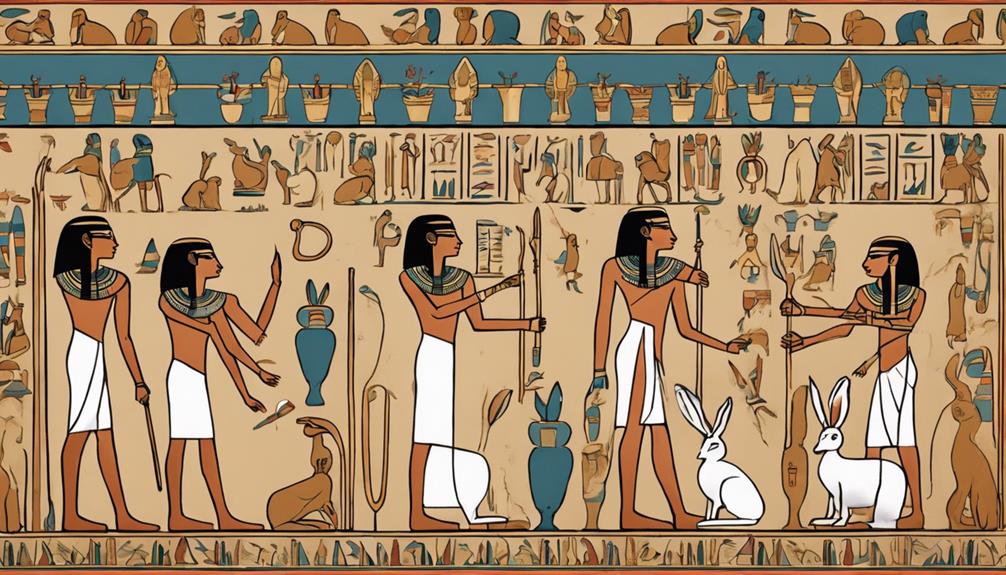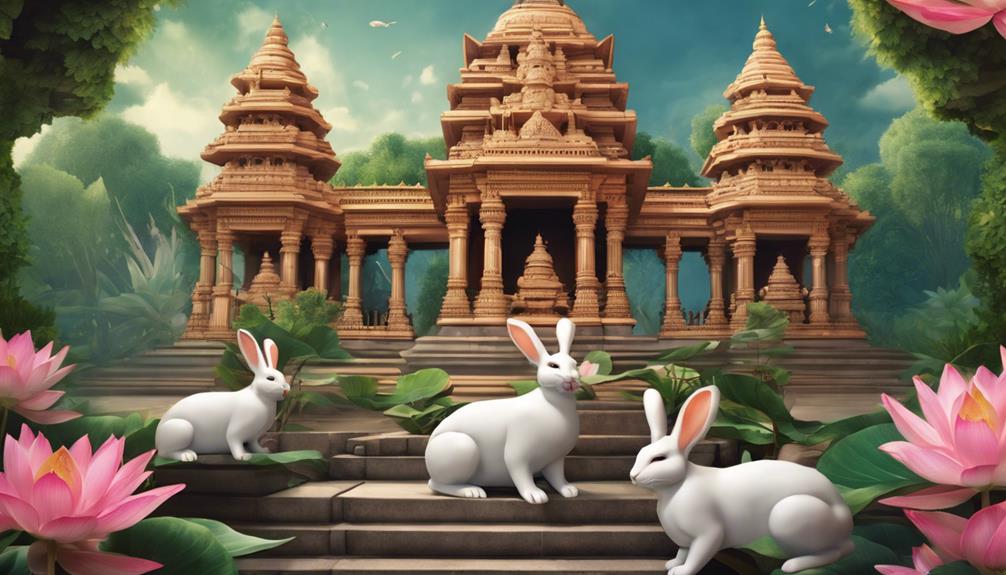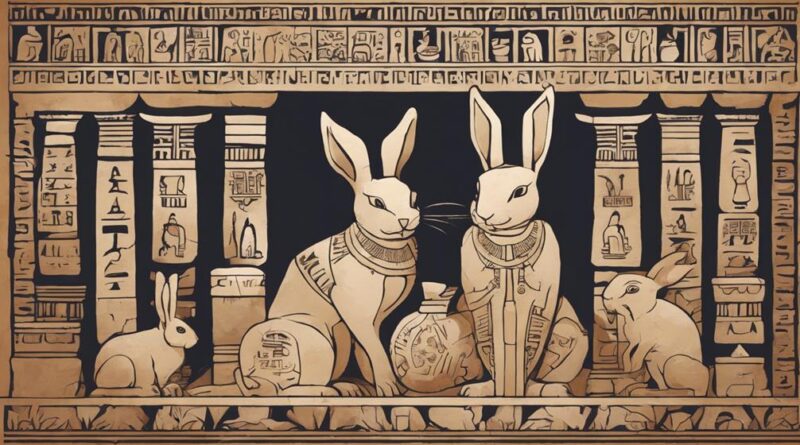Why Did Ancient Civilizations Idolize Rabbits?
Ancient civilizations idolized rabbits for their symbolic significance in fertility, rebirth, and prosperity. Egyptians associated rabbits with regeneration, often offering them to deities like Thoth. Celtic folklore viewed hares as mystical symbols of abundance and new life. Aztecs revered rabbit deities for their ties to fertility and agility. Chinese Zodiac linked rabbits to good fortune and kindness. Across Greek mythology, Native American legends, Hinduism, and Norse mythology, rabbits represented trickery, fertility, and renewal. These cultural beliefs showcase the reverence for rabbits throughout history, reflecting deep-rooted meanings beyond mere animals.
Egyptian Beliefs and Rabbit Symbolism

Exploring Egyptian beliefs reveals the intricate symbolism surrounding rabbits in ancient civilization. In ancient art, rabbit imagery was prevalent, often depicted in various contexts such as burial chambers, temples, and tombs. The Egyptians associated rabbits with fertility, regeneration, and the cycles of life and death. These connections were deeply rooted in their religious and spiritual beliefs, shaping their worldview and understanding of the natural world.
Ritual practices also played a significant role in how rabbits were perceived in Egyptian society. Offerings of rabbits were made to deities like the moon god Thoth, who was often depicted with the head of a rabbit. These offerings symbolized reverence for the divine forces believed to govern the universe. Additionally, rabbits were linked to the concept of resurrection and the afterlife. The Egyptians believed that these creatures possessed qualities that allowed them to transcend the boundaries between life and death, making them powerful symbols in funerary rites and rituals.
Celtic Folklore and Hare Associations
In Celtic folklore, the associations between Hares and various cultural beliefs are rich and diverse, reflecting the intricate tapestry of ancient Celtic traditions. Hares held significant roles in Irish superstitions, often being seen as creatures with mystical qualities. In Celtic mythology, hares were believed to be creatures of the Otherworld, possessing magical powers and often associated with the lunar cycle due to their nocturnal activities.
Pagan rituals among the Celts also incorporated hares into their practices, particularly in ceremonies related to fertility. Hares were symbols of abundance and new life, closely linked to the earth's cycles and the changing seasons. The prolific nature of hares, with their ability to reproduce quickly, made them potent symbols of fertility in Celtic societies.
Moreover, the hare's elusive and mysterious behavior contributed to its allure in Celtic folklore. Often depicted as shapeshifters or messengers between worlds, hares were revered for their connection to the supernatural realm. In some tales, hares were even seen as guides to the underworld, adding to their enigmatic status in Celtic mythology.
Aztec Culture and Rabbit Deities
The Aztec civilization revered rabbit deities in their religious beliefs, attributing symbolic significance to these creatures within their cultural practices and mythology. The worship of rabbit gods held a prominent place in Aztec society, reflecting the deep-rooted cultural significance of these divine creatures.
- Aztec Worship: The Aztecs held a strong belief in the spiritual world, where various gods and deities played essential roles in their daily lives. Among these divine beings were rabbit gods, which were honored and revered through rituals and ceremonies.
- Rabbit Gods: In Aztec mythology, rabbit gods were often associated with fertility, abundance, and agility. These deities symbolized prosperity and were believed to bring blessings to the people who worshiped them.
- Cultural Significance: The presence of rabbit deities in Aztec culture underscored the importance of nature and its cycles in their society. The Aztecs viewed rabbits as symbols of renewal and growth, aligning them with concepts of rebirth and regeneration.
- Divine Creatures: Rabbits were considered sacred animals in Aztec mythology, embodying qualities that were highly valued by the Aztec people. As divine creatures, rabbits held a special place in religious ceremonies and were believed to act as messengers between the mortal world and the supernatural realm.
Chinese Zodiac and Rabbit Significance
Rabbit symbolism in the Chinese Zodiac holds significant cultural and astrological importance, resonating with themes of luck, compassion, and sensitivity. In the Chinese Lunar calendar, the Rabbit is the fourth animal of the zodiac cycle and is seen as a symbol of good fortune and prosperity. Individuals born under the Rabbit sign are believed to possess traits such as kindness, elegance, and a peaceful nature.
In Chinese culture, the Rabbit is associated with the Moon, further emphasizing its connection to tranquility and yin energy. The Rabbit's affinity with the Moon underscores its intuitive and empathetic nature. People born under this sign are thought to be adept at understanding others' emotions and offering support and comfort when needed.
Furthermore, the Rabbit's association with luck and prosperity is evident in various Chinese traditions. During the Lunar New Year, images of rabbits are often displayed to attract good luck and abundance for the coming year. The Rabbit's presence in the zodiac is a testament to its enduring popularity and positive symbolism in Chinese astrology.
Greek Mythology and Rabbit Characters
Symbolizing different themes and attributes across various cultures, rabbits also make appearances in Greek mythology, portraying unique and intriguing characters that add depth to the stories of ancient Greece. In Greek mythology, rabbits aren't as prominent as in other cultures, but they still play significant roles in storytelling.
- Tricksters and Messengers: Rabbits in Greek mythology are often portrayed as cunning tricksters, using their intelligence to outsmart other characters or deities.
- Fertility and Rebirth: Similar to other civilizations, rabbits in Greek mythology symbolize fertility and the cycle of life, representing rebirth and growth.
- Artemis and the Rabbit: The goddess Artemis is sometimes associated with rabbits, as they're animals sacred to her. This connection highlights the protective and nurturing aspects of the goddess.
- Moon and Night Symbolism: In some tales, rabbits are linked to the moon and night, embodying mystery, intuition, and the unseen aspects of life.
These mythical creatures add layers of symbolism and meaning to the rich tapestry of Greek mythology, enriching the narratives with their characteristics and roles. Whether as cunning tricksters, symbols of fertility, companions to deities, or embodiments of nighttime mysteries, rabbits in Greek mythology offer a fascinating glimpse into the cultural significance of these creatures in ancient storytelling.
Native American Legends and Rabbit Tales
Within Native American legends, rabbits emerge as captivating figures embodying diverse cultural narratives and symbolic meanings. In Native American folklore, rabbits often play the role of tricksters in various tales. These trickster tales showcase the cleverness and cunning nature of rabbits, portraying them as quick-thinkers who outsmart others through their wit and resourcefulness. Through these stories, rabbits serve as both teachers and cautionary figures, imparting valuable lessons about wit, adaptability, and survival in the face of challenges.
Moreover, rabbits hold significant animal symbolism in Native American cultures. They're often associated with fertility, abundance, and renewal due to their prolific breeding habits and close connection to the earth. Rabbits symbolize the cycle of life, death, and rebirth, reflecting the interconnectedness of all living beings in the natural world. Their presence in cultural ceremonies and rituals underscores their spiritual connections and the reverence accorded to them as sacred animals.
The cultural significance of rabbits in Native American traditions extends beyond mere storytelling, influencing beliefs, rituals, and societal values. Through their portrayal in folklore and their symbolic representations, rabbits continue to occupy a central place in Native American cultures, embodying lessons of wisdom, resilience, and interconnectedness with the natural world.
Hinduism and Rabbit Symbolism

In Hinduism, the significance of rabbits as symbolic creatures is deeply rooted in the religious and cultural narratives of the tradition.
- Rabbit Fertility: Rabbits are often associated with fertility in Hinduism, symbolizing abundance, prosperity, and the cycle of life. This symbolism is particularly prominent in rituals related to marriage and childbirth, where rabbits may be depicted or invoked to bless the couple or the newborn with fertility and growth.
- Symbol of Renewal: The rabbit's ability to reproduce quickly and abundantly aligns with the Hindu belief in regeneration and renewal. In Hindu rituals, rabbits symbolize the cyclical nature of life, death, and rebirth, emphasizing the eternal cycle of existence.
- Sacredness in Hindu Rituals: Rabbits hold a sacred status in certain Hindu rituals, where they're revered for their connection to fertility and vitality. Their presence in these ceremonies underscores the importance of fertility as a divine blessing and a fundamental aspect of life.
- Spiritual Significance: Beyond their physical attributes, rabbits in Hinduism carry spiritual significance, representing the interconnectedness of all living beings and the divine energy that flows through every aspect of creation. Their symbolism serves as a reminder of the intricate balance and harmony within the cosmos, reflecting the intricate tapestry of existence in Hindu beliefs.
Norse Mythology and Rabbit Lore
Rabbits play a distinctive role in Norse mythology and folklore, intertwining with tales of gods, heroes, and the natural world. In Norse mythology, rabbits are often associated with fertility symbolism. They're seen as creatures representing abundance, growth, and the cycle of life. Just like rabbits multiply rapidly, they're linked to the concept of prosperity and new beginnings in Norse culture.
Within rabbit lore in Norse mythology, these creatures also embody the trickster archetype. The trickster figure is prevalent in many mythologies worldwide, and in Norse myths, rabbits are sometimes portrayed as cunning and mischievous beings. They're known to outsmart larger animals and even gods through their cleverness and quick thinking. This trickster aspect adds depth to the portrayal of rabbits in Norse stories, showcasing them as not just symbols of fertility but also as crafty and resourceful creatures.
Frequently Asked Questions
How Did Rabbits Become Associated With Fertility in Ancient Civilizations?
When considering rabbit symbolism in ancient rituals, it's fascinating to delve into how these creatures became linked to fertility beliefs. Their cultural significance was tied to their prolific breeding habits, symbolizing abundance and new life.
Through various rituals and myths, rabbits were revered for their ability to reproduce rapidly, embodying the concept of fertility. This association with procreation and renewal contributed to the rabbit's enduring role in ancient civilizations' beliefs and practices.
Were Rabbits Considered Sacred in Any Ancient Cultures?
Rabbits held a sacred status in various ancient cultures, with rituals and offerings dedicated to them. These animals were imbued with mythical symbolism and beliefs that portrayed them as symbols of fertility, rebirth, and abundance.
The reverence for rabbits often extended to including them in religious ceremonies and as divine representations in folklore. Across different civilizations, the spiritual significance of rabbits played a significant role in shaping cultural practices and beliefs.
Did Ancient Civilizations Believe Rabbits Had Supernatural Powers?
Ancient civilizations attributed mystical qualities to rabbits, believing in their supernatural powers. Rabbit symbolism was prevalent in folklore and ancient beliefs, where these creatures were seen as symbols of fertility, abundance, and agility.
The reverence for rabbits went beyond their physical characteristics, with many cultures associating them with luck, cunning, and even the divine. These mystical connotations contributed to the idolization of rabbits in various ancient societies.
Were There Specific Rituals or Ceremonies Involving Rabbits in Ancient Times?
In ancient times, rabbits played a significant role in various rituals and ceremonies. Their symbolism was deeply rooted in fertility, rebirth, and abundance.
Ancient civilizations incorporated rabbits into their ceremonies as symbols of renewal and prosperity. These rituals often involved offerings to honor the rabbit's connection to the cycles of nature.
The reverence for rabbits in these ancient practices highlights the importance of these animals in the spiritual and cultural beliefs of the time.
How Did the Symbolism of Rabbits Differ Across Various Ancient Civilizations?
In various ancient civilizations, rabbits held diverse symbolic meanings, reflecting cultural interpretations. They were associated with fertility, rebirth, and agility, signifying historical significance.
Artistic representations often depicted rabbits in religious contexts, showcasing their spiritual symbolism. The differences in how rabbits were perceived across cultures shed light on the unique beliefs and values of each civilization.
Understanding these varied interpretations enriches our knowledge of the symbolism attached to rabbits in ancient times.
Conclusion
In conclusion, ancient civilizations idolized rabbits for a variety of reasons, including their symbolism of fertility, agility, and cunning.
From Egyptian beliefs to Celtic folklore, Aztec culture to Chinese zodiac, rabbits held a special place in the hearts and minds of people across the world.
Whether as deities, characters in mythology, or symbols of luck and prosperity, rabbits were revered and respected in different cultures for their unique qualities and significance.
